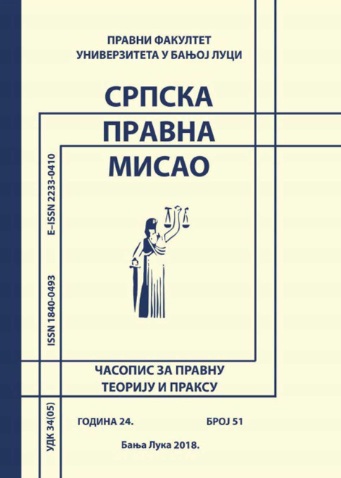BOSNA I HERCEGOVINA I EVROPSKA UNIJA INTEGRACIONI PROCES
BOSNIA AND HERZEGOVINA AND THE EUROPEAN UNION INTEGRATION PROCESSES
Author(s): Rajko Kasagić, Alisa SalkićSubject(s): Civil Law, International Law, Human Rights and Humanitarian Law, EU-Approach / EU-Accession / EU-Development, EU-Legislation
Published by: Правни факултет Универзитета у Бањој Луци
Keywords: market; development funds; foreign policy; security; judicial cooperation;
Summary/Abstract: The developed economy in the world is characterized by a very dynamic structure of change, both in production and in the market position of individual countries. Economic trends in the world have been accompanied by faster growth in world trade than growth in production. Therefore, each state seeks to find its place in the international division of labor and a satisfying market position, although domination of industrially developed countries is not called in to question. In the conditions of modern market and technological changes, it is difficult to imagine an integration process in terms of globalization without a more active role of developed countries. Diplomacy plays an important role in the integration of the economic territories of certain countries. Its importance is of particular importance for economic, but also for political integration in Europe and the European Union. Bosnia and Herzegovina has a political and economic interest in joining the EU, and has already started to use the European Union funds for programs, based on the Framework Agreement between the European Union and Bosnia and Herzegovina. Funds according to program scan be used by institutions, citizens and business people. Writing a good project for economic development comes down to the craft. The methodology adopted in the EU in the 1990s was based on the methodology used by Americans in the 1960s, whose basis was the analysis of the logical frame work or logical matrix. Investing funds from EU funds aims to create a competitive BiH economy for the Union’s (internal) market. However, economic cooperation is only one and “first pillar” of the European integration process. A significant step in the development of foreign policy cooperation and security has been achieved in the Maastricht Treaty by the introduction of the “second pillar” with in the European Union. Thus, the Maastricht Treaty to Foreign Policy has incorporated the security segment, which Member States are obliged to actively and unreservedly support. External policy and security of EU member states can not be at an appropriate level unless internal security is established in each country. It is therefore important to establish appropriate judicial cooperation and cooperation between the police, that is, create a European judicial area. In this way, the “third pillar” was created in the area of law and internal affairs.
Journal: Српска правна мисао
- Issue Year: 2018
- Issue No: 51
- Page Range: 189-207
- Page Count: 19
- Language: Serbian

